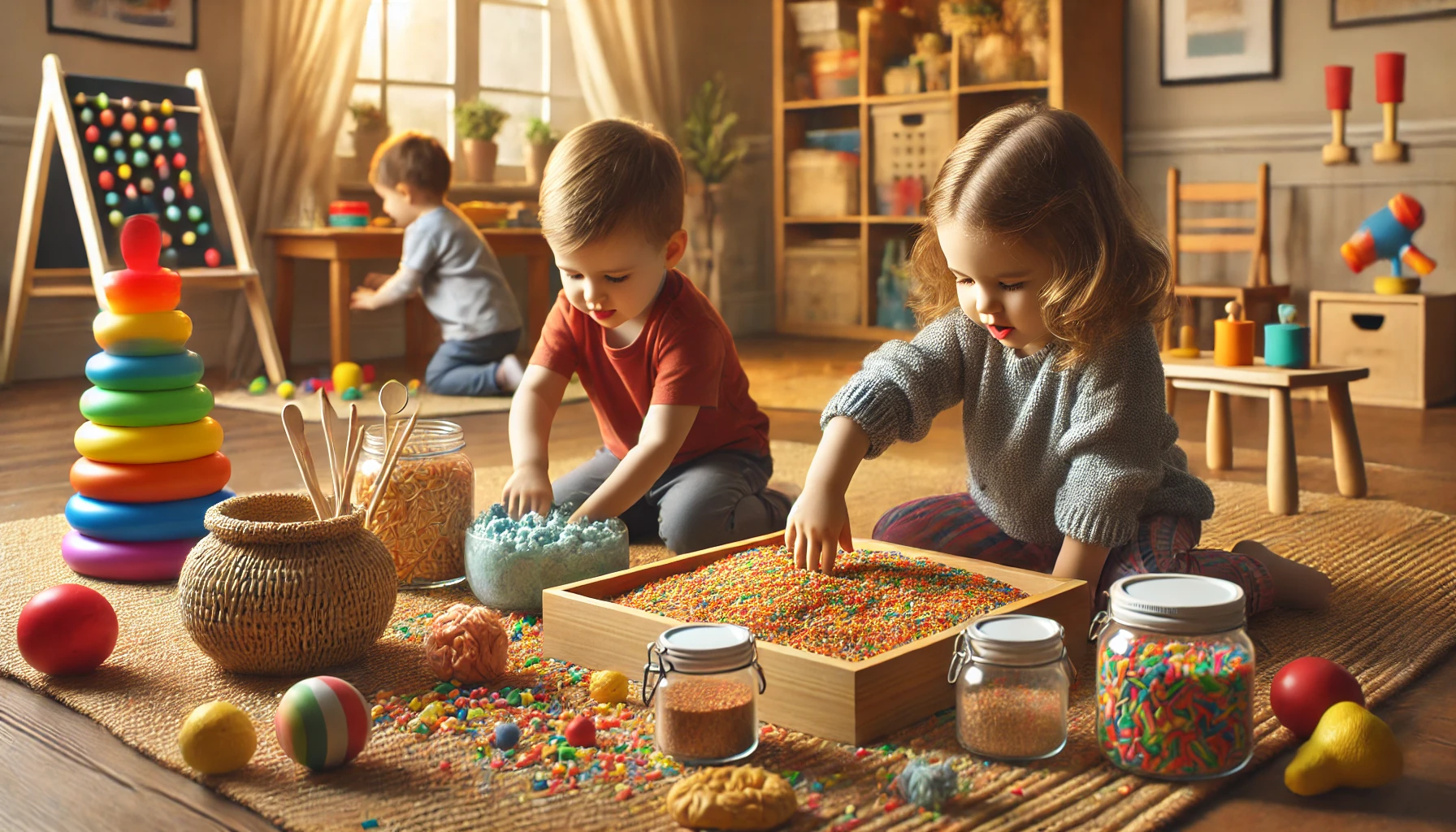Sensory play is a crucial part of early childhood development, helping children explore the world through touch, sight, sound, taste, and smell. These activities support brain development, improve motor skills, and enhance problem-solving abilities. In this article, we’ll explore the benefits of sensory play and suggest fun, hands-on activities to stimulate young children’s senses.
Why Sensory Activities Are Important
Sensory play provides children with experiences that strengthen their cognitive, physical, and emotional development. Some key benefits include:
✅ Enhances Brain Development: Engaging multiple senses helps build neural connections that support learning and memory.
✅ Improves Motor Skills: Activities like scooping, squeezing, and pinching help develop fine and gross motor coordination.
✅ Encourages Language Development: Describing textures, colors, and sensations boosts vocabulary and communication skills.
✅ Supports Emotional Regulation: Sensory play can be calming and helps children manage emotions and reduce anxiety.
Fun and Engaging Sensory Activities
Tactile (Touch) Activities
1. Sensory Bins
Fill a container with different materials like rice, sand, or dried beans. Add scoops, cups, and small toys for children to explore different textures.
2. Shaving Cream Play
Spread shaving cream on a tray and let children draw shapes, letters, or patterns with their fingers. For extra fun, add food coloring to create colorful designs.
3. Playdough Creations
Encourage children to mold and shape playdough. Add different textures by mixing in rice, sand, or glitter for an enhanced sensory experience.
4. Ice Cube Exploration
Freeze small toys in ice cubes and let children use warm water or salt to melt them. This activity teaches cause and effect while improving fine motor skills.
Visual (Sight) Activities
5. Color Sorting Game
Provide colorful objects (blocks, pom-poms, or buttons) and have children sort them by color. This strengthens visual perception and categorization skills.
6. Light and Shadow Play
Use a flashlight in a dark room and create different shadow shapes on the wall. Let children guess the object behind the shadow.
7. Rainbow Water Mixing
Fill clear cups with colored water (using food coloring) and let children mix them to see how new colors are formed. This introduces basic science concepts in a fun way.
Auditory (Sound) Activities
8. DIY Musical Instruments
Make homemade instruments like rice shakers (using sealed plastic bottles) or drum sets with pots and spoons. Encourage children to experiment with different sounds.
9. Sound Matching Game
Fill containers with different materials (beans, paper clips, rice) and shake them. Ask children to guess what’s inside based on the sound.
10. Animal Sound Guessing Game
Play animal sounds and let children guess which animal it is. This activity strengthens listening skills and auditory discrimination.
Olfactory (Smell) Activities
11. Scented Playdough
Add vanilla, cinnamon, or lavender essential oils to homemade playdough for an engaging smell experience.
12. Mystery Scent Jars
Fill small jars with scented materials like coffee, lemon peel, or mint leaves. Have children smell each jar and guess the scent.
13. Baking with Aromatic Ingredients
Let children help mix cinnamon, chocolate, or herbs into dough. This activity engages both smell and touch while teaching basic cooking skills.
Gustatory (Taste) Activities
14. Taste Test Game
Prepare small bites of sweet, sour, salty, and bitter foods. Let children taste and describe each flavor to build sensory awareness.
15. Fruit and Vegetable Exploration
Give children different fruits and vegetables to touch, smell, and taste while discussing textures and flavors.
16. Make-Your-Own Smoothies
Allow children to choose fruits and blend them into smoothies. This activity introduces healthy eating while engaging multiple senses.
Tips for Encouraging Sensory Play
✔ Supervise activities to ensure safety, especially with small objects and taste-based play.
✔ Use descriptive words to help children express their sensory experiences.
✔ Encourage open-ended play to allow creativity and exploration.
✔ Keep materials simple and accessible using household items.
Final Thoughts: Exploring the World Through the Senses
Sensory activities provide endless learning opportunities for young children, helping them develop important cognitive and motor skills while having fun. By incorporating hands-on experiences into daily routines, parents and educators can create an engaging environment where children explore, learn, and grow naturally.
